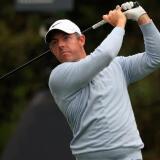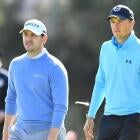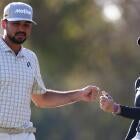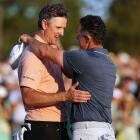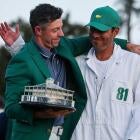Golf is a game of small margins. Tiny margins, even. A lipped-out putt that would have fallen if it had been a millimeter to the left could cost you $400,000 or your first major championship (or both). This isn't relegated to on-course action, either. The same is true of fantasy golf or wagering on the sport, too.
One thing I didn't understand when I got into golf writing is that the point of wagering or playing fantasy golf isn't that you're able to pick the correct player every week -- that would be impossible -- but rather that you're wisely choosing from a pool of players who the general public (or Vegas) is undervaluing.
This is what fantasy and betting wizard Mike McClure of Sportsline does with his golf model, which spit out Bryson DeChambeau as somebody he loved last week. I need not tell you that DeChambeau won his third event last week at The Northern Trust by four strokes.
I was curious, though, about what goes into such a model. There are innumerable golf stats -- going through the PGA Tour's stats pages will give you a headache in no time -- but McClure told me that he narrows down his choices in any given week based on 10,000 simulations of running player ratings against probable scores on any given hole at an event for all four rounds.
This sounds complex -- and it is -- but the crux of it is in the player rating.
That's what affects the probabilities, and McClure said that a player rating is influenced by 10-15 metrics but most influenced by four or five things like strokes gained, strokes gained on approach shots, strokes gained putting and par-5 scoring from the last 36 rounds. Those aren't always the inputs, but for this week at the Dell Technologies Championship -- based on historical data from TPC Boston -- they are the ones that count. Because courses are not all the same, the influential inputs change from week to week.
This often reveals that Dustin Johnson and Justin Thomas are going to perform well, but anyone can predict something like that, so I dug a little deeper for where the model provides the most value.
"It stands out overall when you get guys like Bryson when you look at the betting market he might be a top 15 golfer," said McClure. "You look at his world ranking, he's not necessarily going to pop up as a top-five golfer. But if you understand that strokes gained approach and putting is super important at this event ... it helps remove some of the bias by having the power rating and how it simulates that."
Yes! This is what I want from models like this. Who are the golfers who are undervalued because they aren't big names. I think I know this, but I'm basing it on a less sophisticated set of standards than McClure is (basically strokes gained overall and my eyes). Patrick Cantlay isn't sexy -- and in a lot of ways neither is DeChambeau -- and because of this their betting numbers are artificially inflated to bring in money. That's where the value can be found.
"Winning a golf tournament, as you know, is incredibly difficult to do," said McClure. "It highlights those guys that are showing up in the top 25 -- you get those names like Cantlay and Bryson -- if they're popping into the top 20 or 15 in this model, it means they're somebody you should probably consider betting because they have a significant opportunity to win the event simply because it's very hard to win a golf tournament."
Who should you back in the Ryder Cup? What about the majors and every tournament in between? Join SportsLine today and get projected scores and stats from 10,000 simulations, plus expert picks, fantasy advice and much more! Use promo code KICKOFF to get your first month for only $1!
![[object Object] Logo](https://sportshub.cbsistatic.com/i/2020/04/22/e9ceb731-8b3f-4c60-98fe-090ab66a2997/screen-shot-2020-04-22-at-11-04-56-am.png)






